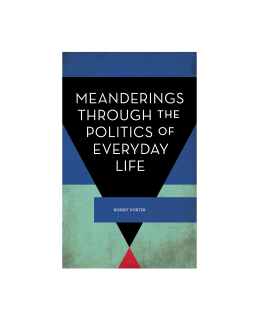
Additional Information
Book Details
Abstract
The politics of everyday life is to be found, time and again, in meandering movements, in making connections across and between things in the rough and tumble of the seemingly banal, fragmentary and quotidian experiences that make up our day-to-day existence. The key point of the book, ideally as well as practically, is to realize that there may be something potentially significant, and politically significant, in the very act of making such connections, of understanding the supposedly trite and trivial world of the everyday against a broader political backcloth. There is merit in sifting the fragments, the fragmentary experiences, of everyday life in order to see how they imply a broader political totality in which they are situated and, at times, cleverly made to function. This intuition, broadly inspired by Henri Lefebvre, is reflected in and through the various and varying ways Porter puts to work the ideas and provocations of thinkers such as Raoul Vaneigem, Gilles Deleuze, and Soren Kierkegaard.
In this playful and acute renewal of Situationism – and overdue homage to Raoul Vaneigem – Robert Porter dissects and disturbs the heaviness of contemporary theory. He does so with an uncommon yet necessary passion for everyday life, as first political site, thereby unleashing an essential good humour against our (understandable) tendency to gloom and doom.
James Williams, Professor of Philosophy, Deakin University
Robert Porter is Director of the Centre for Media Research, Ulster University.
Vaneigem and Deleuze rewired for the 21st century. A marvellous argument for the continuing relevance of situationism and a sustained attack on the new absurdities this century has thrown at us so far.
Ian Buchanan, Professor of Cultural Studies, University of Wollongong
Table of Contents
| Section Title | Page | Action | Price |
|---|---|---|---|
| Contents | 7 | ||
| Acknowledgements | 9 | ||
| 11 | |||
| Introduction. Or, Some Directions for You, My Ideal Reader . . . | 11 | ||
| Part 1. The Jaded Lecturer and a Seminar on Critique | 17 | ||
| Part 2. The Conceptual Significance of Everyday Life | 21 | ||
| Part 3. Retail Politics | 24 | ||
| Part 4. Shifting Registers | 27 | ||
| Part 5. After the Aesthetic Seduction Comes the Philosophical Guilt | 31 | ||
| Part 6. The Old Problem of Recuperation | 37 | ||
| Part 7. Wile E. Coyote and the Logic of an Absent Present | 44 | ||
| Part 8. The Jargon of Indebtedness | 48 | ||
| Part 9. Welcome to the Pleasure Dome | 51 | ||
| Part 10. A Joke Explained . . . as a Jag; Or, Credo Quia Absurdum | 57 | ||
| Part 11. The Key Thing Is that We’re at the Beginning of Something New | 61 | ||
| Part 12. We’re Told that Businesses Have Souls, Which Is Surely the Most Terrifying News in the World | 71 | ||
| Part 13. ‘You’re Fired!’ ‘OK, Go Fuck Yourself!’ | 75 | ||
| Part 14. The Absurdity of Working to Rule | 81 | ||
| Part 15. Zombie Workers and the Rise and Rise of the Futurist-Sophists | 85 | ||
| Part 16. Orgasmic Political Theory, Events, and Their Rippling Effects | 95 | ||
| Part 17. The Drama of Philosophical Imperialism | 104 | ||
| Part 18. Resisting the Philosopher’s Jargon | 109 | ||
| Conclusion. Or, Eighteen Steps to a New You | 121 | ||
| Notes | 131 | ||
| Bibliography | 141 | ||
| Index | 145 |
